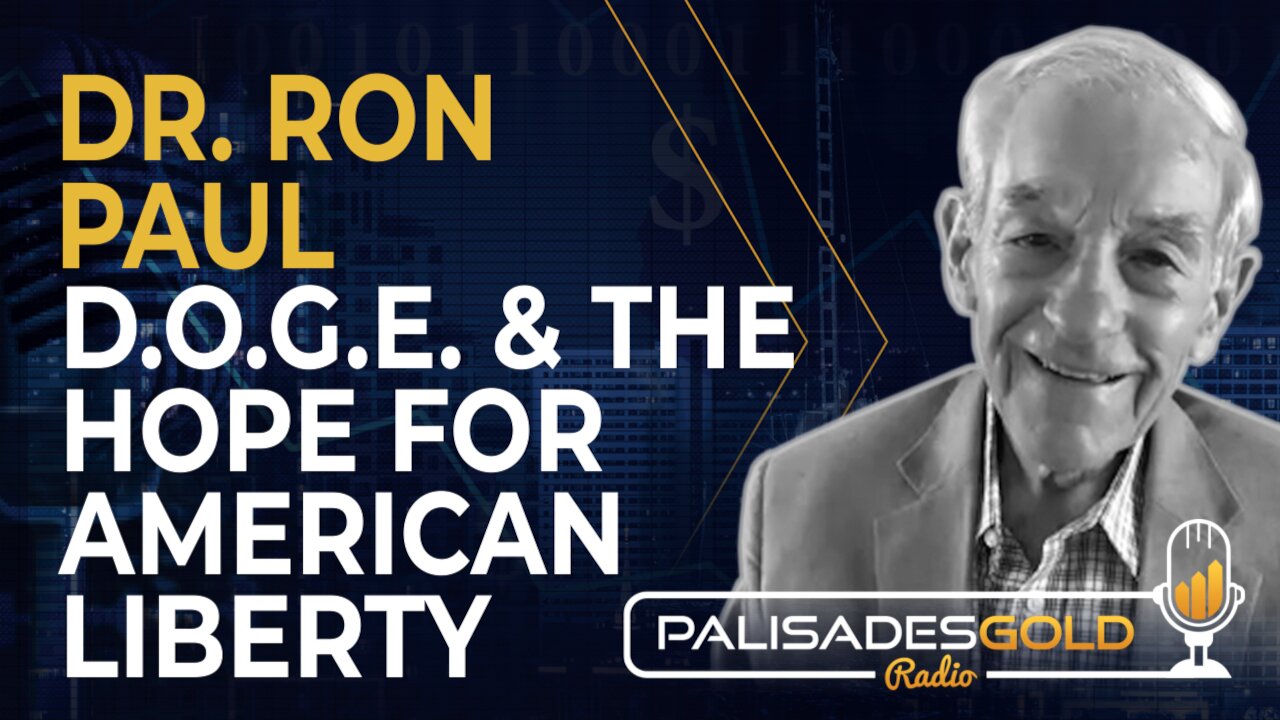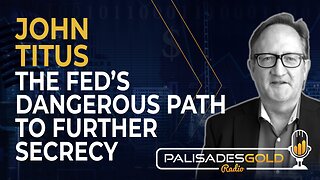Premium Only Content

Dr. Ron Paul: D.O.G.E. & The Hope for American Liberty
Tom Bodrovics welcomes back former congressman Dr. Ron Paul from Texas and Liberty Report host to discuss the link between liberty and the economy. Dr. Paul insists that freer societies are more prosperous, advocating for a sound monetary policy as crucial for economic health. He condemns interventionist policies and criticizes the Federal Reserve's manipulation of interest rates, citing 1921 as evidence of a hands-off approach leading to a better recovery from an economic downturn.
During the conversation, Dr. Paul expresses his aspiration to terminate the Federal Reserve and proposes steps towards accomplishing this goal, including repealing the Federal Reserve Act and enforcing the Constitution. Although he acknowledges that the process might not be easy due to the nation's addiction to low-interest rates and easy money, he emphasizes the importance of recognizing inflation as a tax on people's money and advocates for Fed auditing as a path to transparency.
Dr. Paul supports gold-backed bonds as a means of promoting fiscal restraint and offering individuals a valuable savings opportunity. He denounces tariffs as an ill-conceived solution for economic matters, suggesting instead the elimination of burdensome business regulations. Furthermore, Dr. Paul expresses concerns about government information's lack of transparency and encourages citizens to educate themselves on constitutional principles in order to safeguard individual liberties.
Dr. Paul concludes by urging listeners to act upon their convictions and principles, underlining the significance of education in history and economics. He also presents his homeschooling curriculum as a substantial contribution to fostering individual liberty and countering excessive government control over education and healthcare. Ultimately, Dr. Paul underscores the importance of personal accountability and the risks of government intervention in diverse areas.
Time Stamp References:
0:00 - Introduction
0:36 - Economics of Liberty
3:24 - Government Efficiency
5:00 - Audit & End The Fed
12:58 - Shelton & Gold Bonds
14:36 - Tariffs & Regulations
23:12 - Accurate Information?
25:36 - What Should We Do?
27:29 - Wrap Up
Talking Points From This Episode
- Dr. Paul advocates for ending the Federal Reserve and promoting sound monetary policy.
- He supports gold-backed bonds, fiscal restraint, and eliminating excessive regulations.
- Dr. Paul emphasizes individual responsibility and education as keys to liberty.
Guest Links
Twitter: https://x.com/ronpaul
Website: http://www.ronpaullibertyreport.com/
Website: http:///ronpaulinstitute.org
Ron Paul is an American author, physician, and former politician. He was the U.S. Representative for Texas' 14th and 22nd congressional districts. Ron represented the 22nd congressional district from 1976 to 1977 and from 1979 to 1985 and then represented the 14th congressional district, which included Galveston, from 1997 to 2013. On three occasions, he sought the United States presidency: as the Libertarian Party nominee in 1988 and as a candidate in the Republican primaries of 2008 and 2012. Paul is a critic of the federal government's fiscal policies, especially the Federal Reserve and the tax policy, as well as the military-industrial complex and the War on Drugs. Paul has also been a vocal critic of mass surveillance policies such as the USA PATRIOT Act and the NSA surveillance programs. Paul was the first chairman of the conservative PAC Citizens for a Sound Economy and has been characterized as the "intellectual godfather" of the Tea Party movement.
A native of the Pittsburgh suburb of Green Tree, Pennsylvania, Paul is a graduate of Gettysburg College and the Duke University School of Medicine, where he earned his medical degree. He served as a flight surgeon in the U.S. Air Force from 1963 to 1968. In addition, Ron worked as an obstetrician-gynecologist from the 1960s to the 1980s. He became the first Representative in history to serve concurrently with a son or daughter in the Senate when his son, Rand Paul, was elected to the U.S. Senate from Kentucky in 2010.
Paul is a Senior Fellow of the Mises Institute and has been an active writer, publishing on the topics of political and economic theory and publicizing the ideas of economists of the Austrian School such as Murray Rothbard and Ludwig von Mises during his political campaigns. Paul has written many books on Austrian economics and classical liberal philosophy, beginning with The Case for Gold (1982) and including A Foreign Policy of Freedom (2007), Pillars of Prosperity (2008), The Revolution: A Manifesto (2008), End the Fed (2009) and Liberty Defined (2011).
-
 58:12
58:12
Palisades Gold Radio
8 days agoJohn Titus: The Fed's Dangerous Path to Further Secrecy
641 -
 42:22
42:22
CryptoWendyO
54 minutes agoTRUMP MAKES CRYPTO HISTORY! Bitcoin To $1.5 Million By 2030 says Cathie Wood!
1 -
 58:57
58:57
The Big Mig™
2 hours agoGlobal Finance Forum From Bullion To Borders We Cover It All
3.13K3 -
 2:26:20
2:26:20
Benny Johnson
3 hours ago🚨Trump SHOCK Announcement LIVE Right Now | Trump Assassination Report Release, Assassin in Court
122K86 -
 1:06:46
1:06:46
The Rubin Report
3 hours agoDems Furious at Gavin Newsom for Admitting This to Charlie Kirk
67K41 -
 2:01:07
2:01:07
LFA TV
17 hours agoDEATH OF THE DEMOCATS! | LIVE FROM AMERICA 3.7.25 11AM
62.8K24 -
 LIVE
LIVE
The Dana Show with Dana Loesch
2 hours agoThe Dana Show LIVE On Rumble! | 03-07-25
764 watching -
 27:24
27:24
Tudor Dixon
3 hours agoThe Left’s Madness with Ryan Girdusky | The Tudor Dixon Podcast
14.9K4 -
 59:48
59:48
Randi Hipper
4 hours agoDonald Trump makes HISTORY with Strategic Bitcoin Reserve Announcement
47.7K7 -
 49:45
49:45
BonginoReport
8 hours agoTrump’s Cryptic Putin Threat (NEW STUDIO) (Ep.155) - 03/07/2025
154K298